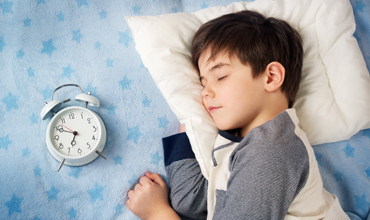Reevaluate Your Child’s Sleep Needs When You Reset Your Clock
Daylight savings time ends on Sunday, November 6 and we must set our clocks back one hour. Although we don’t actually lose an hour of our day, it may feel like it for parents who have trouble getting their child to sleep. This year, use the time change as a reminder to reevaluate your child’s sleep needs and take steps to improve sleep hygiene.
How Time Change Affects Sleep
When we set our clocks back one hour, we disrupt our natural sleep-
wake cycle. This cycle, called the circadian rhythm, helps us feel sleepy at night when it gets dark and helps us wake up in the morning when it gets light. Meal timing and physical activity also influence this cycle. When a child’s bedtime shifts rapidly, the body may not feel like going to sleep.
Children Need More Sleep Than Adults
Children need more sleep than adults because they are growing both physically and mentally. Yet about 3 out of 4 teens and 1 out of 3 children don’t get enough sleep on school nights.
For optimal health the American Academy of Sleep Medicine (AASM) says that: for optimal health the American Academy of Sleep Medicine (AASM) says that children in elementary (ages 6 to 12 years old) need 9 to 12 hours of sleep and teenagers who are in middle and high school need 8 to 10 hours of sleep.
To easily calculate what time your child should go to bed, use the AASM’s bedtime calculator at
www.sleepeducation.org/bedtime. Enter the child’s age and wake time. For example, bedtime for a 13-year-old boy who needs to get up at 6:15 a.m. should be between 8:15 p.m. and 10:15 p.m.. Notice that the recommended amount of sleep is given as a range. To decide the best amount within the range, monitor how easy it is to get the child out of bed in the morning. If he or she is exhausted and doesn’t want to get up, then more sleep is needed. Move the bedtime back in 15-minute increments until the child can get up when the alarm rings.
Not Enough Sleep Causes Problems
When children don’t get enough sleep, their health and behavior suffer. Some problems are.
- More colds and illnesses—When a child is sleep deprived, the body is not as well equipped to fight off illnesses when exposed to them.
- Behavioral problems—Children who do not get enough sleep tend to act out more, be more oppositional and throw more temper tantrums when they’re tired.
- Daytime wetting—Younger children can have more daytime wetting accidents when sleep deprived.
- Problems in school—Sleep deprivation in school-aged children often presents with problems in school. Some are problems focusing and paying attention, sloppy work and forgetting to turn in homework and assignments. Children may even fall asleep in class.
How to Help Your Child Adjust to the Time Change
Make a plan to help your child adjust to the time change. Starting on November 2, put your child to bed 15 minutes earlier. Continue moving the bedtime back 15 minutes for the next 3 nights leading up to the time change. This will allow the child’s body to slowly get used to going to bed at the new time. It is also important to wake the child up the next morning at the normal awake time. Don’t let your child sleep in. Consistency is important for establishing a healthy sleep-wake cycle.
What to Do If Bedtime is a Problem
If bedtime is a problem, work on establishing good sleep hygiene, no matter the age of the child.
- No electronics or TV within 1 to 2 hours of bedtime. The light waves from the TV or electronic devices are the same frequency that the body uses to reset the internal clock. This light tells the child that it is daytime and time to wake up.
- Same routine every night. Children should have the same routine every night. This may include having dinner, doing homework, taking a bath or shower, reading a book and going to bed. Whatever the routine is, it primes the subconscious for bedtime and sleep.
- Same bedtime every night. It’s also important to go to bed at the same time 7 nights a week. When children stay up until late hours on the weekend, especially teenagers, they develop symptoms much like jet lag by Sunday night. It takes 3 or 4 nights to readjust and by that time it is the weekend and the cycle starts all over again.
When to Talk to Your Pediatrician
If a child is having trouble falling asleep (length awake more than an hour) for more than a week, monitor their sleep hygiene. This includes no electronics or TV within 1 to 2 hours of bedtime, the same routine every night and the same bedtime every night. If your child has good sleep hygiene and is still having problems, talk to your pediatrician.
Brenda Schoolfield is a medical writer and editor who lives in Austin. Sugar, her cocker spaniel, and sometimes a rescue foster dog or two keep her company while she writes.

















